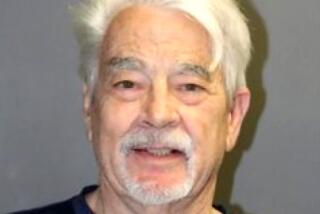‘Breast Expert’ Accused of Smuggling
- Share via
Frederic H. Corbin calls himself “the Breast Expert.”
But after more than two decades of helping women achieve the look they want, the plastic surgeon finds his own image in need of sculpting.
Corbin, 62, is accused of smuggling illegal silicone breast implants into the United States and placing them in his patients. Federal prosecutors also allege that the doctor, who has offices in Beverly Hills and Brea, falsified patients’ medical records so they could receive American silicone implants that doctors were testing. If found guilty, he could face as many as 10 years in prison.
Silicone implants were taken off the market in 1992 over concerns they might cause autoimmune diseases if they leaked. The ban has spurred a black market for the implants, which are considered more natural in appearance and feel than saline-filled ones approved for use in the nearly 300,000 U.S. women who have cosmetic breast surgery every year.
Federal regulators appear close to approving silicone implants, but the process isn’t moving fast enough for some women.
“Silicone gel is the preferred implant when you talk about the Coke-or-Pepsi test,” said James Wells, a Long Beach cosmetic surgeon and past president of the American Society of Plastic Surgeons. “If you give them the choice between a gel and a saline implant and cover it with a towel, just on texture and feel they will more often than not pick the gel implant.”
The Food and Drug Administration allows silicone implants to be used in research studies or for reconstructive surgery for women who have had mastectomies. But silicone implants are widely available outside the U.S.
U.S. women regularly travel to Mexico for breast augmentation at discount prices. At the Tijuana clinic Medica Norte, a receptionist said 80% of the women who came to have their breasts enlarged were American and almost always chose silicone.
Some women buy their own silicone implants outside the U.S. and ask their doctors to put them in.
Reached by telephone, an employee at the pharmacy Sara Imports in Tijuana, said he sold European silicone implants to two or three U.S. women every month.
“My impression is that people will do what they want to do if they think the benefits outweigh the risks,” Wells said.
The federal government has prosecuted only a handful of cases against doctors and alleged smugglers. One of the largest seizures took place in 1995 when an Oklahoma doctor was caught smuggling more than 500 Brazilian implants from the Bahamas.
In Corbin, women found a surgeon who seemed dedicated to his craft. His work had been featured in popular magazines, such as People and Self.
He met his wife, Corinne, when she came to his office to have her breasts redone. After they married, she wanted to work in her husband’s office. He agreed, but only if she allowed him to redo her nose because he didn’t want patients to think her previous nose job was his work. Corinne agreed, according to an interview she gave to Marie Claire magazine.
Corbin’s websites, which also tout him as the “Nose Expert” and “Gynecomastia (male breast reduction) Expert,” advertise his charity work with groups such as Operation Smile, which flies surgeons to Third World countries to correct birth defects.
The smuggling indictment is not the first time Corbin has gotten into trouble.
In February 1992, he was charged with insurance fraud and conspiracy, accused of fabricating an office visit to help a patient commit fraud. He pleaded no contest to a misdemeanor. Corbin paid $4,000 to a court fund and performed 25 hours of community service, and the case was dismissed. The Medical Board of California put the surgeon on two years’ probation.
Corbin neglected to mention the criminal charges when routinely reapplying to continue practicing at St. Jude Medical Center in Fullerton. As a result, the hospital in 1997 revoked his staff privileges.
Corbin’s most recent legal problems began in July 2001 when the FDA received a tip from one of his former employees. The woman told investigators that she’d found several pages in the doctor’s surgical log book indicating that he’d put the French-made implants into several women.
According to court documents, Corbin was using the imported implants as early as 1996, when a woman asked him if he would implant French-made silicone she’d gotten in Mexico. Corbin agreed and soon began importing implants from a woman in Tijuana, according to court documents.
During the same period, Corbin was participating in a study of Mentor-rand silicone implants. Women with health problems requiring reconstructive surgery were eligible to receive the implants. The study prohibited using the devices simply for aesthetics.
But if a healthy patient asked Corbin for silicone, the doctor would create false records to qualify them for Mentor implants, court documents allege.
A nurse told investigators that from 1999 through 2001, the doctor gave Mentor implants to about 40 women who should not have qualified for the study, according to court records. But the February federal indictment charged him with making up records for only three women.
Corbin’s lawyer, Drew Allan Cicconi, said the accusation was the work of a disgruntled former employee. He said his client did not create false records. “He’s tried to be nice to people and sometimes gets into trouble for that,” Cicconi said.
Prosecutors say they don’t plan to charge the women who received the implants.
“They probably knew they were getting the preferred implants, but I don’t know that they knew they were breaking the rules to get them,” said Ken Julian, the assistant U.S. attorney who is prosecuting the case.
More to Read
Sign up for Essential California
The most important California stories and recommendations in your inbox every morning.
You may occasionally receive promotional content from the Los Angeles Times.










